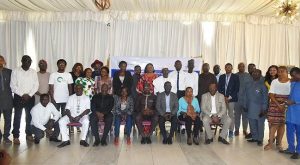The Nigerian Conservation Foundation (NCF) has called for collaboration between government, private sector and communities to ensure climate justice for all in the country.

Dr Joseph Onoja, Director General of NCF, made the call at a two-day workshop on Strengthening Civil Society Voices on Climate Justice in Nigeria, and the inauguration of the Nigeria Climate Justice Alliance, on Wednesday, July 26, 2023, in Abuja.
Onoja said climate justice was both environmental and human right issue that required joint action to address.
“Climate change is not a distant threat, it is here, affecting lives and livelihoods across our nation. Climate justice is not just an environmental issue, it’s a matter of social equity and human rights.
“The consequences of climate change disproportionately affect vulnerable communities and marginalised populations, amplifying existing inequalities.
“As we strive to create a sustainable future, we must remember that climate justice demands that no one is left behind, that no community is sacrificed for the sake of progress. This is the essence of climate justice.”
Onoja said that the country has been feeling the impact of climate change, adding that “in every corner of our country, communities are feeling the impacts of extreme weather events, rising sea levels, and changing climates.’’
Onoja therefore said every individual irrespective of status has a role to play in mitigating the effects of climate justice.
“Whether it’s advocating for climate policies, reducing our carbon footprint, or supporting initiatives that empower marginalised communities, every action counts.
“Let us draw strength from our shared vision of a Nigeria where environmental sustainability, social equity, and human rights go hand in hand.
“Together, we can forge a path towards a just and sustainable future, leaving a legacy of positive change for generations to come,” Onoja added.
On the Nigeria Climate Alliance 2023 to 2027, Onoja said it was aimed at linking civil society organisations on the climate space to have one voice in projecting issues of climate justice.
Mr Emmanuel Kuyole, Programme Officer, Ford Foundation, said the foundation was committed to addressing inequalities across, including ensuring climate justice.
According to him, climate justice is about how we manage nature and environment and to keep it intact for the generations.
“Those of us alive today have a big responsibility and role to play to keep this planet that we have in a manner that the next generation will find a good place to live,’’ he added.
Kuyole said though considerable progress had been made regarding policies on climate in Nigeria, there was however non-involvement of communities whose lives and natural resources were greatly impacted by climate change in formulating the policies.
“Nigeria has policies on climate issues but one of the areas we have observed as a big gap is that in all these processes, the communities whose lives and livelihood is greatly impacted especially their natural resources are not involved.
“For the past two years the foundation have being trying to support to make sure that citizens’ rights are central in all these conversation, especially those impacted directly are involved in these processes,” he said.
Mrs lbironke Olubamise, National Coordinator, UNDP Global Environment Facility – Small Grants Programme (GEF-SGP), identified climate justice as a generational and development issue.
Olubamise, who made a presentation on “Mobilisation and Delivery Impactful Climate Justice Actions at the Grassroot level”, said climate justice required effective engagement, empowerment and livelihood enhancement.
She listed pillars of climate justice to include climate education and engagement; community resilience and adaptation; natural climate solutions; social, racial and environmental justice; justice transition and collaboration; and indigenous climate action.
“Effective engagement of communities is key in climate justice because if they are not aware they can do nothing.
“Also, when we enhance the livelihood of communities they will do great in achieving climate justice,” she added.
By Felicia Imohimi
